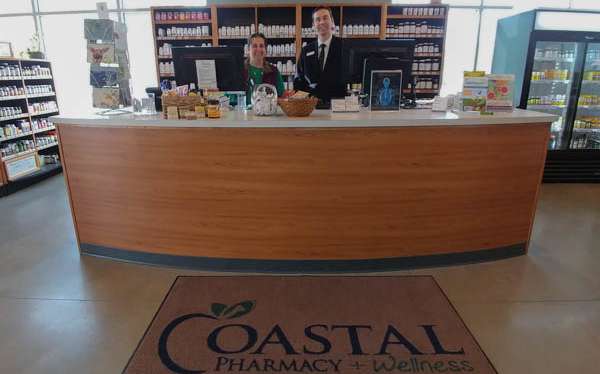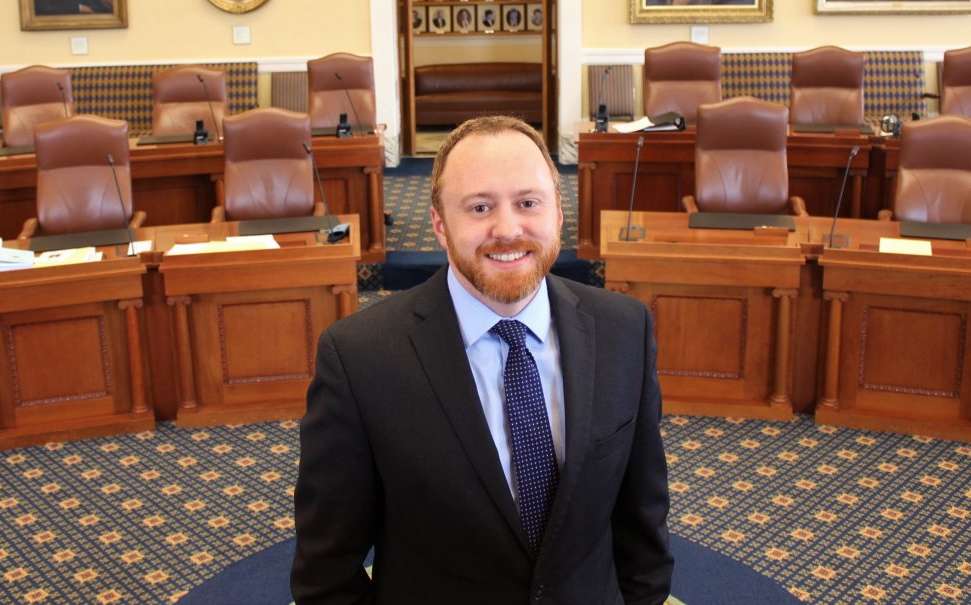
Processing Your Payment
Please do not leave this page until complete. This can take a few moments.
Insurers may be driving Maine pharmacies out of business, but bill could help
 Photo / William Hall
Coastal Pharmacy & Wellness is one of the Maine pharmacies saying that fees applied long after they conduct business can drive the businesses out of business. The pharmacy, on Marginal Way in Portland, stopped filling retail prescriptions as a result.
Photo / William Hall
Coastal Pharmacy & Wellness is one of the Maine pharmacies saying that fees applied long after they conduct business can drive the businesses out of business. The pharmacy, on Marginal Way in Portland, stopped filling retail prescriptions as a result.
Some small Maine companies are looking for relief from a complex payment system they say is driving them out of business — but legislation currently in the Statehouse could help.
The bill, LD 1928, introduced in January by state Sen. Nate Libby, D-Lewiston, would prohibit fees that health insurance companies charge pharmacies after they dispense medication and settle up.
“Local, independent pharmacies are getting jerked around by insurance companies just the same as everyday Mainers are. Some pharmacies are finding themselves owing hundreds of thousands of dollars a year in unexpected costs,” Libby said in a news release. “This bill helps them stay in business, serving our communities.”
Insurers and their middlemen, pharmacy benefit managers, say the fees are based on performance goals set up with the pharmacies. The standards are usually designed to encourage better operations and better adherence by patients to their medication therapy.
But the fees, known as “clawbacks,” typically arrive six to nine months after claims have been submitted and adjudicated. A single clawback can run over $100,000. And the pharmacies say that because of the way insurers calculate the charges, it’s difficult to predict how much they’ll tally.
“The fees just put local pharmacies in an impossible position, and create a completely unpredictable environment,” Libby told Mainebiz in an interview.
The problem has been growing worse in recent years. For example, retroactive fees charged by Medicare drug insurance carriers exploded 45,000% between 2010 and 2017, according to the federal Centers for Medicare and Medicaid Services.
Facing the huge, unbudgetable bills, Maine pharmacies — especially small, independent ones, without the deep pockets of national chains — have resorted to desperate measures. Clawbacks forced one independent Maine pharmacy to obtain an emergency line of credit so it could make payroll, according to Libby.
At Coastal Pharmacy & Wellness in Portland, Principal Cassi Brooks knows the impact first-hand. In 2017, the retroactive fees drove Coastal to stop doing retail pharmacy business, filling the common, high-volume prescriptions that are typically covered by health insurance.
“It was really hard, and not something we wanted to do. Patients cried,” Brooks told Mainebiz.
Coastal today still does business in customized, “compounded” medications, as well as in nutritional supplements. “But we were losing money on [retail] because of these fees,” Brooks said. “It couldn’t pay for itself.”
The business, which had a couple of dozen staff but employs half that number today, was squeaking out a narrow margin on most retail prescriptions. To then receive a large bill on them, months later, was simply too much. A single prescription that had resulted in perhaps a $2 profit suddenly lost the pharmacy $50.
“The math didn’t work,” Brooks said. “You can’t make a negative profit.”
The performance incentives aren't effective, she added. "They have nothing to do with performance. They have everything to do with making money," she said.

Libby agreed, saying that there's "no connection to the consumer" because the fees are applied so long after the pharmacies fill the prescriptions.
Joe Lorello, a pharmacist for over 40 years and also a principal at Coastal, said, the clawback provisions are “so vague you can’t begin to figure them out or plan.”
“The model doesn’t work practically for independent pharmacies. And the direct result has been pharmacies closing in Maine.”
Divided vote, divided opinions
Libby’s bill passed out of the Legislature’s Health Care, Insurance and Financial Services Committee on Feb. 6 with a 5-4 partisan vote. The legislation now awaits votes on the floors of the House and Senate, and if ultimately passed would go to Gov. Janet Mills for her possible signature.

At a committee hearing, representatives of the insurance industry spoke in opposition to the bill.
Kim Cook, of Lewiston-based Community Health Options, said it would prevent insurers from correcting mistakes discovered after a pharmacy claim was processed.
"Removing the right to adjust claims that have been paid by the carrier but were submitted with ... an underlying error is removing an important means of controlling costs and, ultimately, premiums paid by our members," she said.
Katherine Pelletreau, executive director of the Maine Association of Health Plans, said the bill "would eliminate the ability to use performance-based contracting, an important tool for lowering costs and improving value for patients." She said that performance measurements resulting in retroactive charges include patient refill rates, data related to opioids and the rates at which pharmacies dispense generic medicines.
But most testimony supported the bill.
Michael Nadeau, owner of Bedard Pharmacy and Medical Supplies, said his business has paid more than $700,000 in retroactive fees over the past two years. The Auburn-based company employs 80 people there and at locations in Lewiston and South Paris.
"These fees are taken back directly from our payments months after a claim was originally paid and almost always leave us with a net loss on the prescription where we previously had some level of profit," he said. "Reigning in the opaque practices of PBMs and payers is overdue. These entities force pharmacies to sign take-it-or-leave-it contracts with no negotiation on reimbursements or fees."
Steve Maki, who owns Spruce Mountain Pharmacy in Jay, said his seven-person business recently received a bill for $8,000 in clawbacks.
"This $8,000 is money which has already been paid to me and now is going to be taken back," Maki said. "I have paid my employees, paid my rent, electrical bill, phone bill and all the other operational cost with my business. I don’t have the option to go back to my vendors and pull back payments already made for their services."
Maki said he anticipates owing $24,000 in retroactive fees by the end of the year.
Clawbacks bite independents hard
While the retroactive fees affect all pharmacies, independent ones like Spruce Mountain feel the pain acutely.
Independents average $3.7 million in annual sales, according to national data, so the fees represent a big chunk of their income. And unlike chain pharmacies, supermarket pharmacies and in-hospital pharmacies, they don’t have a corporate parent that may be able to help with a large unbudgeted expense.
More importantly, the national chains rely less on their drug-dispensing business than independent pharmacies. The aisles of a CVS Health or Walgreens store, compared to those of an independent, demonstrate the difference.
Maine’s independent pharmacies are already an endangered species. In South Portland, the city's last locally owned pharmacy, Moby Rx, was acquired by CVS last year. Previously, CVS acquired a Portland independent, Apothecary By Design, which in 2016 had spun off Coastal. Today it is Portland's only freestanding pharmacy.
Meanwhile, the recent launch of Belfast Drug Co. in that city prompted a Feb. 18 headline in the Bangor Daily News, wondering “why an independent pharmacy opened across from Walgreens.”
The pharmacy owner, Kevin Holland, commented about the odds of a local pharmacy like his succeeding: “They say, ‘Are you crazy?’”
Nationally, independent pharmacies number 22,000 and dispense 36% of prescriptions in the U.S.
But analysis of Maine Board of Pharmacy data shows there are now only about 70 independent pharmacies in the state — out of 737 Maine-based license holders, and thousands of businesses permitted to dispense medication within the state’s borders.
What's more, independent pharmacies are often the lifeblood for many rural communities.
Nearly 1,000 rural, independent pharmacies across the country closed between 2003 and 2013, according to the Rural Policy Research Institute. In Maine, Libby is aware of how vulnerable such businesses are.
"The issues are more acute in small communities," he said.
If excessive fees cause a rural pharmacy to close its doors, there may not be another nearby. The job losses can be "devastating," according to Libby, who once worked as a pharmacy technician. Because of the vital role that pharmacies play in many small Maine towns, there's also an intangible loss.
"It's not simply about dispensing prescriptions," he said.










0 Comments